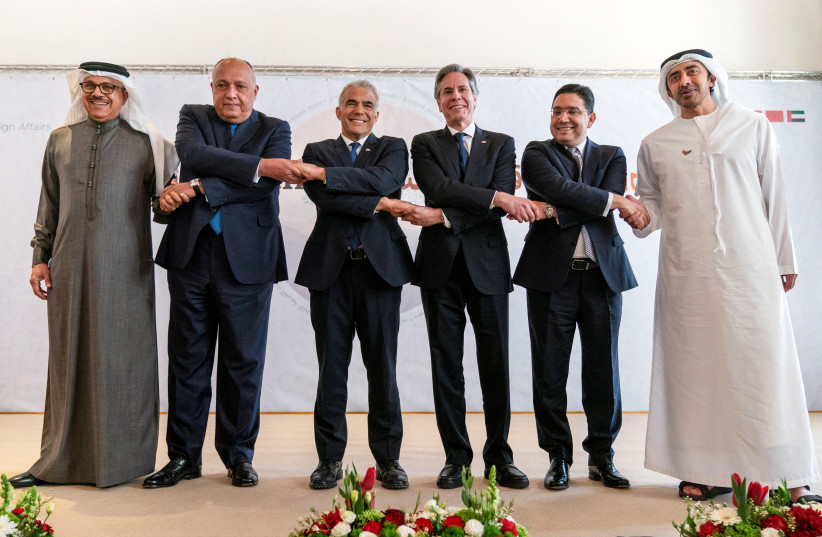When Foreign Minister Yair Lapid hosted the foreign ministers of Egypt, the United Arab Emirates, Morocco and Bahrain in the Negev for a landmark summit in March, alongside US Secretary of State Antony Blinken, the meeting was very much the message.
It was the first time Arab leaders came to Israel to hold a summit, as such meetings are generally held in Sharm e-Sheikh in Egypt, or Aqaba in Jordan. That the summit was held in Israel – and not only in Israel, but at the home of Israel’s first prime minister, David Ben-Gurion – was pregnant with symbolism. It showed that after 74 years, the Arab world was coming to grips and accepting the Jewish state.
This was happening not out of a love for what Israel stands for, but rather because of the recognition that in the hate-filled Mideast full of malevolent actors, Israel is one of the more benign ones.
The UAE, Bahrain, Morocco and even Egypt feel threatened, and have good reason to feel threatened, by Iran and its proxies. They do not feel threatened by Israel. Their participation in that first meeting at Sde Boker sent a message both to the Iranians and to each of those countries’ domestic audiences, that they will cooperate openly and intensely with Israel – even without a resolution to the Palestinian conflict.
<br>Truly a new Middle East

Three months later, senior diplomats from each of these countries met in Bahrain on Monday for the first meeting of the Negev Forum Steering Committee, the first follow-up meeting to that summit in the Negev. This time the meeting itself wasn’t the message; rather, it was the momentum the meeting represented that was the point.
The Sde Boker summit was not a one-off event, just as the signing of the Abraham Accords was not a one-off event, but rather part of a process that continues to pick up steam. The Bahrain meeting was designed, as Yael Lempert, the principal deputy assistant secretary of state for Near Eastern Affairs who represented the US at the meeting said, to put “flesh on the bones”’ of the Negev forum.
What does that mean? It means to set up mechanisms to move the cooperation that began at Sde Boker forward, to set up the working groups and develop plans for cooperation. Initiatives like these wither and die if there is no tangible follow-up and cultivation. It is not enough to just say that the sides want to cooperate on security, climate, and economic issues, but mechanisms must be set in place to ensure that this actually happens.
And again, tellingly, all this is being done without a resolution to the Palestinian conflict.
The final statement put out after Monday’s conference, according to AFP, expressed support for a negotiated settlement to the Palestinian-Israeli conflict. That was to be expected.
But whereas working groups are being set up to further cooperate in six areas – security, clean energy, health, education, tourism, and food and water security – no such group was set up to deal with the Palestinian issue. The Palestinian issue is being paid lip service; the other issues are meriting the establishment of working groups.
That says something: it says that the Arab states realize that if they wait until there is a negotiated settlement to the Palestinian-Israeli conflict before they move forward with Israel, they might not be moving forward with Israel for generations. And they don’t want to wait that long.
The Palestinians strenuously objected to the Abraham Accords, and also the first Negev Forum. The Arab leaders went ahead with their plans anyway, unwilling to give the Palestinians veto power over what they think is important for their national interests. What the Abraham Accords, the Negev Summit, and now the meeting in Bahrain show clearly is that these countries view cooperation with Israel as important for their national interests.
The organizers of Monday’s meeting could not have known that EU foreign policy chief Josep Borell would announce in Tehran the resumption this week of nuclear talks between the world powers and Iran, which the Iranian media said would take place in Qatar.
But the meeting in Bahrain sends a message to those that will be meeting in Qatar that there is a serious resolve among some powerful forces in the Middle East – among countries that until recently did not cooperate openly – to stand firm against Iran.
And that is not an insignificant message. When then-prime minister Benjamin Netanyahu was fighting then-US president Barack Obama against the Iranian nuclear deal in the middle of the last decade, he was doing it alone, albeit with much of the Arab world in the background rooting silently for his success.
Now, however, that Arab support is neither silent nor in the background but rather out there, and, via meetings such as the one held Monday in Bahrain, apparent for all to see.
